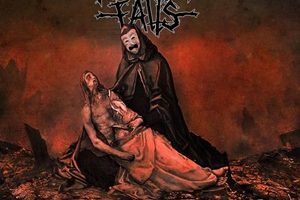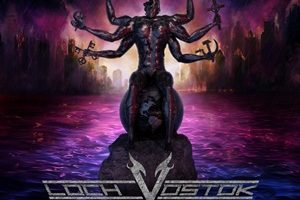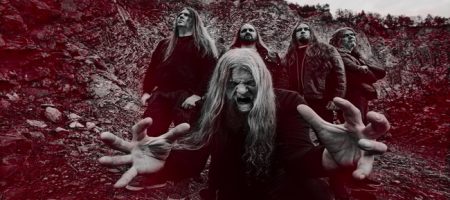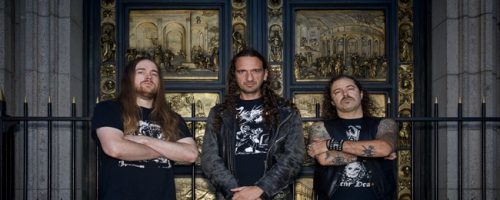A Dark Halo – Elements of Unreality
Tuesday, 4th July 2023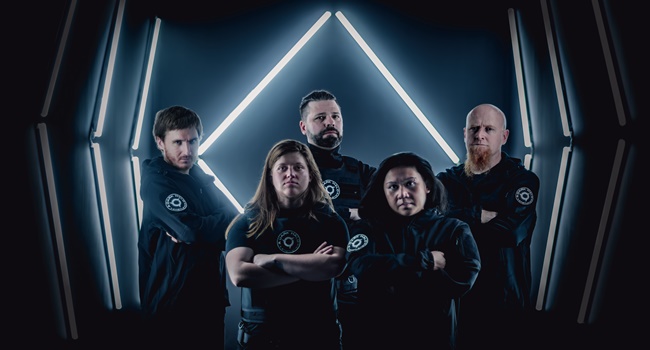
Discovery is a joyous aspect of metal journalism. The opportunity to expose oneself to artists usually not seen or heard otherwise, the ability to hopefully turn other consumers on to these musicians as they advance in establishing a footprint in a heavily crowded scene. A Dark Halo is one of those hidden gems to this scribe – their latest album Omnibus One incorporating a mixture of modern, industrial, groove, and progressive metal aspects that captures quite a potent, addictive style. Reaching out to vocalist/ bassist Dave Lowmiller in this interview, we learn more about his family musical background, the long gap between albums, how the promotion of singles/videos built momentum for the band, how being a part of a wrestling video game exposed them to a different fanbase, dealing with the modern music industry tools to promote the band, and what the future may look like in terms of recordings/live shows.
Dead Rhetoric: What are some of your earliest memories surrounding music growing up in childhood? At what point did you discover heavier forms of music, and eventually start picking up instruments to want to perform your own music?
Dave Lowmiller: My parents were both deeply involved in music. My mom is a concert violinist, and my dad got through college on a vocal scholarship, even though he’s an electrical engineer now. Music was always around my house; I was playing in the school orchestra and the school band from the time I was a little kid. I discovered Van Halen when I was about twelve years old, and everything got heavier. Metallica, Megadeth, into high school, I was playing in marching band, so I cared more about my drum set than anything else in the world. I got into bands like Dream Theater, Fear Factory, and a rabbit hole of metal ever since.
Dead Rhetoric: So, drums were the first instrument you picked up? As I know within A Dark Halo, you play bass, keyboards, and also sing?
Lowmiller: That’s correct. Drums were my first metal love. I played in a lot of bands. Even taught drums for a little while. Yes, in A Dark Halo I’m one of the vocalists, and the bass player. I haven’t played drums in a long time, I’m certainly not as strong as our current drummer Kaye. I feel like if you make me pick an instrument, I feel like my strong suit is actually the computer. I’m a stronger producer and engineer than I am at anything else.
Dead Rhetoric: Tell us about the origins of A Dark Halo back in 2005 -and how you arrived at the cyber-driven metal style that penetrates your songwriting and performances?
Lowmiller: A Dark Halo started as a project between myself and our current guitar player Chris Jones. It was early in the DIY production scene back in 2005. We wanted to see if we could do an album, just the two of us, using Superior Drummer at the time, and lots of time in front of the computer and beers to see if we could make something new and beautiful to us. It sort of bloomed from there into a project that included two other people at the time Justin Corey and Jim McAllister our live drummer. We would play live around the Phoenix scene.
The cyber driven sound – it’s tough to pin down why other than we just love it. Metal is such a big, beautiful tent, it’s cool to incorporate new textures and elements of unreality. It’s not for everybody but I think it makes for a really cool vibe.
Dead Rhetoric: What do you remember about that first album Catalyst? And what sort of challenges arose either in the songwriting or recording process?
Lowmiller: Catalyst was interesting. Before Catalyst was even finished, one of the things that’s important to the DNA of the band is a lot of us are video game developers. I was working in a studio that was working on a wrestling title at the time for the WWE. The executive producer of that project approached us about putting two of our songs in the video game – which is how we got our break, within that wrestling game. Finishing that album after having already done that was challenging but very fulfilling. Again, it’s 2005, it was the dawn of the DIY metal production scene. I remember having a lot of fun with Chris. I remember learning a lot about production in general. I’m a sound designer by trade, I have a lot of experience with motorcycles and explosions, but production top to tail metal albums on my own was a new one on me.
Dead Rhetoric: Omnibus One is the second album for A Dark Halo – seventeen years after your previous debut Catalyst. You did release a series of singles from 2019-2022 prior to this effort – why was there a long gap between releases, and do you believe the issuing singles made sense to build momentum for the rebranding of the band?
Lowmiller: I think it absolutely did. We spent a lot of time appreciating bands like Spiritbox that were big on the releasing singles sort of radar. We weren’t actually sure we were going to put out Omnibus One as an album, we might have been just a singles only project because the landscape has changed so much. Putting out a video with the single helps your chances not just with the existing, appreciative fanbase but with the way the algorithms work on Spotify, YouTube, and all the social media platforms that love them or hate them are a part of the music industry now. Playing to those strengths was definitely in our best interest.
Why the long gap? I was working at a studio in Phoenix making video games like I mentioned. Chris was there too – I ended up taking a job in San Francisco at a different video game studio that was an awful lot of fun, but at the moment it meant goodbye for myself and Jonesy. We hadn’t really figured out remote work yet. One of the other problems with that particular studio is it had a very strong non-compete. I couldn’t work on any side projects outside of the video games I was working on. Fast forward to 2015- I took this job outside of Austin, Texas. Very much they encourage side projects and other artistic endeavors, I got the bug to start making metal again. Metal is life. I contacted Chris, computers had gotten more powerful, the internet had gotten much faster, we figured out a way to collaborate on material remotely and started bringing new people into the project. Next thing you know, we had singles coming out.
Dead Rhetoric: Where do you see the major differences between the debut album and the newest one?
Lowmiller: I personally am a stronger songwriter and a stronger producer than I was when we put out Catalyst. I’m also really proud of the lead guitar work that’s been done by our newest guitarist Abe Robertson. He adds a progressive element to the band that we’ve always wanted but have been kind of missing. The addition of Melrose as our other vocalist, she just added a whole other dimension, like adding a new kick drum or a seventh string to a guitar. And our drummer, the incredibly talented Kaye Papale, all make for a markedly different recipe than what we did on Catalyst. I’m really happy with the way the new record sounds. It’s just proggy enough, harmonically interesting, I think we wrote some really strong hooks, and adequately heavy.
Dead Rhetoric: And how did the guest appearances come about?
Lowmiller: The guest appearances, one of them was a reciprocation for a guest appearance I did on an album for a Russian metal band called Conflict. And their vocalist Anna became a very good friend of ours. She invited me to do guest vocals on one of their albums, it seemed perfect for her to do some vocals on one of ours. We didn’t have a female vocalist full-time in the band yet. The same is true of Kathleen Cylkowski, who is my sister-in-law, she’s a very talented vocalist. The song she appears on “Starfall” was the first time we ever invited a female vocalist on, and our first real delving into mixing male and female vocals – which is sort of the signature sound within Omnibus One.
Dead Rhetoric: When it comes to your videos, do you enjoy the creative aspect of that and how you are able to promote them through social media?
Lowmiller: I love making videos. I love that YouTube has given everyone a platform, it’s a great equalizer. I loved Headbangers Ball growing up, I’m from that generation, but I like that if you promote things properly, and write enough of a banger, anybody can get their music into the ears of a listening audience now. Videos are a big part of that. I’m a film school nerd, so I just like making movies (laughs).
Dead Rhetoric: What comes easier for the band – the musical components or the lyrical themes/melodies? Were there specific songs on Omnibus One that came easier from initial concept to final output than others?
Lowmiller: That’s a really great question. Some of the songs, we perseverated over more than others. “Afterworld” in particular, was our first song with Melrose. We wanted it to be engaging, we wanted it to feature her, show both the beautiful and aggressive sides of metal. Doing all of that deliberately with thought and with purpose took a lot of energy, we feel it was worth it. There are other songs like “Flame Betide” where I just went off into a corner and the song just fell out of me. It’s a mix. We put a lot of thought into the production of every song that we do, we map out counterpoints for the melodies, Abe spends a tremendous amount of time working out the leads and solos. It was a spectrum of difficulty.
Dead Rhetoric: How did the cover art concept come about – was this a collaborative effort between the artist and band to reach what the consumers get for the final piece?
Lowmiller: One of our video game friends, Michael Pedro, we talked about the album as being an omnibus of all the singles. We started joking playfully of what if there was this giant repository of knowledge floating out in space, getting metal? Michael is an amazing game artist; we are really happy with the design and what he was able to come through with.
Dead Rhetoric: You had two of your early songs “Burn it Down” and “Beyond Recall” as a part of the wrestling videogame WWE Day of Reckoning 2. How did this opportunity come about, and what do you think about the correlation between video games and music to expose listeners to artists in a fresh way?
Lowmiller: To answer the second part of your question first, I think it’s amazing there is a confluence of technology and entertainment giving voice to artists that players may not have otherwise heard. As far as the opportunity. I was working as a sound designer at Rainbow Studios in Phoenix. The executive producer on another one of the projects, he was working on one of the wrestling games, he came to me, and I was sort of the resident composer for the shop. He said, ‘hey we had a bunch of licensing material fall through on a wrestling title, we are looking to put a soundtrack together. I heard you play in a band; can I hear it?’. I said, ‘yes sir, absolutely!’. I showed him “Burn It Down” and “Beyond Recall”, we did the paperwork, and I ended up doing some custom composition for that title as well. They put together the licensed soundtrack, two of our songs were on it – we got a loyal fan base through the wrestling community that has stuck with us because of that. We are super grateful for the opportunity.
Dead Rhetoric: What are some of the biggest goals that you set for A Dark Halo as far as where you want things to go career-wise? Is it a balancing act at this point pursuing your music side of things with also holding down full-time careers, families, and personal relationships?
Lowmiller: It’s definitely a balancing act. It’s something that we all love doing. You just make the time. Because we are distributed across the country, it’s a lot like the remote work revolution of 2020. We send stems around, song ideas around, we can make metal. It’s amazing what technology has been able to do for us. As far as what we want to do with it – honestly, I think I speak for all of us when I say we just want to make music that’s beautiful to us and get it into as many ears as we possibly can. Things like Spotify from artists can give us tools to monitor and promote that, social media has obviously been really huge. Talking to journalists like yourself to get the word out – it’s a big deal for us.
Dead Rhetoric: What do you think of the modern music industry model now? What do you enjoy about it, and are there changes you would make (if any) regarding how things are going today compared to the older business model of the 80’s and 90’s?
Lowmiller: I think it’s weird. It’s fraught with peril and blessings both. You can love it, not love it – Spotify is the music industry right now. For a band like us, it’s a kind of equalizer. We are able to reach people without producing a ton of physical media, without a huge investment of keeping all that media on hand, without paying massive distributions fees, we are able to reach people all over the planet. When we play our cards right, we get algorithmic bumps from those platforms that expose us to new people that never would have heard us in a million years.
All of that is definitely a blessing. At the same time, it has decreased the demand for things like physical media. It’s decreased our drive to create things like physical media. We are doing it, but we are fully cognizant of the fact that it fits a certain niche for certain segments of our listeners. More the exception than it is the rule, as it was in the 90’s.
Dead Rhetoric: Because you are so spread out across the country, does this mean that live shows will be sporadic, taken on a case-by-case basis?
Lowmiller: We’ve been working on figuring that out. We want to take the show live again. We used to play live frequently when we were based out in Phoenix. We prioritized getting the right talent over getting necessarily people just because they were local. There is a ton of great talent in Austin, don’t get me wrong. Mel is in Chicago, she’s the right person. We are talking more about targeted shows, maybe small festivals. It’s entirely possible that the project will stay entirely in the studio and keep creating music videos and singles. I’m honestly more worried about that than playing live. I love playing live and attending live events. We are sort of a different project.
Dead Rhetoric: What would you say are three of the most important albums that have helped shape your outlook on heavy music in general? And what’s the best concert memory you have, taking in a show as a fan attending – and what made that show so special to you?
Lowmiller: I have to pick three. Probably Type O Negative – October Rust. Fear Factory – Demanufacture. I have to say Dream Theater- Awake. They all taught me different things. Type O Negative taught me that metal can be hauntingly beautiful. Fear Factory taught me that beauty can live alongside extreme brutality. Dream Theater taught me just how many notes there are in the whole world. The value of musicianship and how cool it is to be able to master a sweep arpeggio, I thought that was a formative trinity of albums.
As far as shows. I’ve been to a lot that have meant a lot to me. I’m going to pick Type O Negative again on the October Rust tour. That show blew my sixteen-year-old mind. We saw it at an intimate venue called the Electric Ballroom. They played perfectly, the visuals were just what they needed to be, there was a snow machine. I have been to so many shows that mean so much.
Dead Rhetoric: Discuss the importance of working with a PR firm like C Squared Music and how they’ve been able to help you improve your presence through their media push for A Dark Halo?
Lowmiller: C Squared has been great. We were handling all of our own PR and social media up until we met up with them. They’ve been able to connect us to journalists such as yourself. We did not have that reach before. Their copywriting is really good as well. They’ve increased the visibility and the quality of our press releases. They’ve been able to give us coaching on when we should release the final single before the album, counsel on how our copy should look. Curtis and Corinne have been great.
Dead Rhetoric: What’s on the horizon for activities related to A Dark Halo over the next twelve months or so to support this release? Has work already begun on the next set of material – and if so, where do you see things going direction-wise?
Lowmiller: We definitely have some irons in the fire and started some new compositions. We have at least one really cool collaboration lined up. Working on those as individual pieces of art is going to be paramount. I don’t know for certain what the future looks like – it may be all singles. Maybe we will do another album, or another EP. I want to make sure we are chasing that sound that we love.











